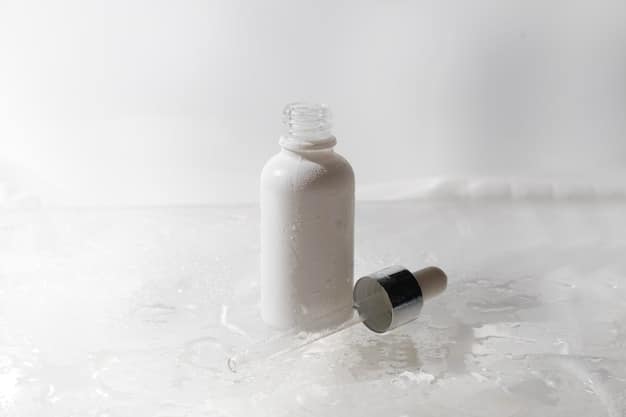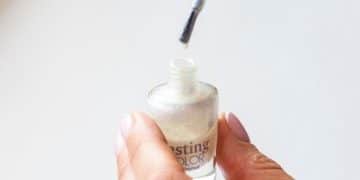5 Dermatologist-Recommended Anti-Aging Ingredients for 6-Week Results
Dermatologists recommend incorporating five key anti-aging skincare ingredients—retinoids, vitamin C, hyaluronic acid, niacinamide, and peptides—into your routine for visible improvements in skin texture, tone, and overall youthfulness within approximately six weeks.
Looking to rewind the clock on your skin? The quest for youthful, radiant skin leads many down countless aisles of serums and creams. But what truly works? Leading dermatologists consistently recommend five key anti-aging ingredients that can deliver visible results in as little as six weeks. Let’s explore these powerhouse ingredients and how to incorporate them into your skincare regimen for a rejuvenated complexion.
Top 5 Anti-Aging Ingredients Dermatologists Recommend
The world of anti-aging skincare can feel overwhelming, filled with buzzwords and promises. To cut through the noise, let’s focus on the essentials—the ingredients that dermatologists repeatedly endorse for their proven effectiveness in combating the signs of aging.
These five ingredients are backed by scientific research and clinical trials, demonstrating their capacity to improve skin texture, reduce wrinkles, and enhance overall radiance. By understanding how these components work and integrating them wisely into your routine, you can unlock a more youthful and vibrant complexion.
Understanding the Science Behind Anti-Aging
Before diving into the specific ingredients, it’s crucial to understand the biological processes that contribute to skin aging. Factors like sun exposure, pollution, and natural collagen decline play significant roles. Effective anti-aging ingredients target these issues at a cellular level.
- Sun Protection: The sun is the biggest agressor, causing collagen and elastin breakdown. Prevention is better than cure.
- Collagen Stimulation: Some ingredients boost collagen synthesis, thus plumping and firming the skin.
- Antioxidation: Antioxidants neutralize free radicals generated by sun and pollution, protecting the skin.
By grasping these fundamentals, you’ll appreciate the importance of using targeted, effective ingredients for optimal skin health and rejuvenation.
In summary, remember that aging doesn’t happen overnight. It is a process; therefore its remedy also calls for consistency. Choose wisely, stay consistent, and protect yourself from factors like the sun that bring about aging symptoms.
Retinoids: The Gold Standard for Wrinkle Reduction
Retinoids, derivatives of vitamin A, have long been hailed as the gold standard in anti-aging skincare. Their effectiveness isn’t just anecdotal; it’s supported by extensive research and decades of clinical use. These ingredients work by stimulating collagen production, increasing cell turnover, and improving skin texture.
From prescription-strength tretinoin to gentler over-the-counter options like retinol, retinoids offer various levels of potency to suit different skin types and concerns. Understanding the nuances of retinoid usage is key to unlocking their transformative benefits while minimizing potential side effects.
How Retinoids Transform Your Skin
Retinoids function by binding to retinoid receptors in skin cells, influencing gene expression and cellular behavior. This interaction leads to several positive outcomes, including:
- Increased Collagen Production: Retinoids stimulate fibroblasts to produce more collagen, which helps to reduce the appearance of fine lines and wrinkles.
- Accelerated Cell Turnover: Promoting quicker shedding of old, damaged cells and replacing them with fresh, new ones, resulting in smoother and radiant skin.
- Improved Skin Tone and Texture: Addressing hyperpigmentation and unevenness for a more uniform complexion.
Retinoids are a powerful tool in the fight against aging, but their potency demands careful application and monitoring.

Retinoids can be a game-changer in your skincare routine, leading to visible improvements in skin firmness, texture, and tone. Incorporate them gradually and consistently to reap the rewards of this powerhouse anti-aging ingredient.
Vitamin C: A Powerful Antioxidant for Brighter Skin
Vitamin C is a potent antioxidant that plays a crucial role in protecting the skin from environmental damage and promoting collagen synthesis. This powerful ingredient is not only essential for overall health but also offers remarkable benefits for combating the signs of aging.
By neutralizing free radicals, reducing hyperpigmentation, and boosting collagen production, Vitamin C can effectively brighten the complexion, improve skin texture, and diminish the appearance of fine lines and wrinkles. Incorporating Vitamin C into your daily skincare routine can lead to a more radiant, youthful appearance.
The Science Behind Vitamin C’s Benefits
Vitamin C, also known as ascorbic acid, works through several mechanisms to deliver its anti-aging effects:
- Antioxidant Protection: Neutralizes free radicals caused by UV exposure and pollution, thus preventing damage and premature aging.
- Collagen Synthesis: Stimulates collagen production, which is fundamental to maintaining skin elasticity and reducing wrinkles.
- Hyperpigmentation Reduction: Helps to fade dark spots and even out skin tone by suppressing melanin production.
Vitamin C’s multifaceted benefits makes it a valuable addition to any anti-aging skincare regimen.
In many regards, Vitamin C stands tall as a protective and restorative ingredients in skincare. Incorporating it into your daily practice is likely a giant step towards healthier skin.
Hyaluronic Acid: Hydration is Key to Youthful Skin
Hyaluronic acid (HA) is a naturally occurring substance in the skin that acts as a powerful humectant, attracting and retaining moisture. As we age, our skin’s HA levels decline, leading to dryness, loss of elasticity, and the appearance of fine lines and wrinkles.
Supplementing the skin with HA through skincare products can significantly improve hydration levels, resulting in plumper, smoother, and more youthful-looking skin. Incorporating HA into your routine is a simple yet effective way to combat dehydration and maintain a healthy skin barrier.
Maximizing Hydration with Hyaluronic Acid
Hyaluronic acid’s unique molecular structure allows it to hold up to 1000 times its weight in water, making it an exceptional hydrator. Here’s understanding its major roles:
To maximize its hydrating potential, follow these tips:
- Apply to Damp Skin: HA works best when applied to damp skin, such as after cleansing or using a toner.
- Layer with Occlusives: Seal in the hydration by layering an occlusive moisturizer over your HA serum or cream.
- Use in Humid Environments: HA draws moisture from the surrounding environment, so it functions optimally in humid conditions.
Ensuring adequate hydration is a critical step in maintaining youthful-looking skin, and hyaluronic acid is an indispensable tool for achieving this goal.
As far as moisture is concerned, hyaluronic acid is the ultimate source! In simple terms, make it a vital element in your effort to maintain younger, softer, and hydrated skin.
Niacinamide: A Multi-Tasking Ingredient for All Skin Types
Niacinamide, a form of vitamin B3, is a versatile ingredient that offers a wide range of benefits for all skin types. From reducing inflammation and improving skin barrier function to minimizing pores and evening out skin tone, niacinamide addresses multiple concerns associated with aging.
Incorporating niacinamide into your skincare routine can contribute to a healthier, more balanced complexion with improved texture, reduced redness, and enhanced overall radiance. This well-tolerated ingredient is suitable for both sensitive and acne-prone skin, making it a valuable addition to any anti-aging regimen.

Diverse Benefits of Niacinamide
Niacinamide’s versatility stems from its ability to influence various cellular processes:
Here’s a short list of what it does:
- Strengthens Skin Barrier: By stimulating ceramide production, niacinamide fortifies the skin barrier, reducing moisture loss and increasing resilience.
- Reduces Inflammation: Soothes irritated skin, diminishes redness, and alleviates inflammatory conditions like acne and rosacea.
- Minimizes Pores: Can regulate oil production, which reduces the occurrence of blocked pores, and can therefore reduce the size of your pores.
Its multifaceted action makes niacinamide a superb choice for those hoping to boost their anti-aging skincare.
So, if you would like one item that will perform a multitude of tasks for the skin, don’t pass up on Niacinamide. Through the balancing of skin tone, decreasing swelling, and enhancing hydration, it is really a significant element for a younger look.
Peptides: Building Blocks for Firmer Skin
Peptides are short chains of amino acids that serve as building blocks for proteins like collagen and elastin. As we age, the production of these essential proteins diminishes, resulting in loss of firmness, elasticity, and increased wrinkling.
By incorporating peptides into skincare products, we can signal the skin to produce more collagen, strengthening its structure and reducing the signs of aging. Peptides come in diverse forms, each with unique properties and capabilities. Choosing the right peptide-infused products can enhance skin firmness and resilience.
Different Types of Peptides and Their Functions
Peptides operate by encouraging the skin to create more collagen, strengthening the skin structure and decreasing the visibility of wrinkles.
Some of the most common types include:
- Signal Peptides: Inform the skin to produce more collagen.
- Carrier Peptides: Transport nutrients to the skin and enhance healing.
- Neurotransmitter Peptides: Help relax facial muscles, thus reducing the appearance of expression lines.
Peptides are able to offer the right building elements to keep skin solid and to decrease common signs of aging!
When peptides are infused straight into your daily skin health, it’s like offering the skin the most essential components to stay healthy. Choose the appropriate kinds, remain persistent, and enjoy the advantages of more firm, and smooth skin.
| Key Point | Brief Description |
|---|---|
| 🌟 Retinoids | Reduce wrinkles and improve skin texture. |
| 🛡️ Vitamin C | Brightens skin and protects against damage. |
| 💧 Hyaluronic Acid | Hydrates and plumps the skin. |
| 💪 Peptides | Promote firmer and more elastic skin. |
Frequently Asked Questions
▼
It’s usually not advisable to use all five ingredients at once, especially if you have sensitive skin. Start by introducing one ingredient at a time and monitoring your skin’s reaction. If your skin tolerates it well, you can gradually add more ingredients.
▼
A general guideline is to apply products from thinnest to thickest consistency. After cleansing, start with Vitamin C serum (if using), then apply hyaluronic acid serum, followed by niacinamide, retinoid (at night), and lastly, a moisturizer or peptide cream.
▼
While generally safe, individual reactions can vary. Those with sensitive skin should exercise caution, particularly with retinoids and Vitamin C. Perform a patch test before applying any new product to your entire face.
▼
Results vary depending on your skin type and the severity of aging signs. However, with consistent use, you may begin to notice improvements in skin texture and tone within approximately six weeks. Optimal results typically appear after 12 weeks.
▼
It is essential to consult with your doctor before using any skincare products during pregnancy. Retinoids, in particular, should be avoided during pregnancy due to potential risks to the fetus. Your doctor can recommend safe alternatives.
Conclusion
Incorporating these five dermatologist-recommended anti-aging ingredients – retinoids, vitamin C, hyaluronic acid, niacinamide, and peptides – into your skincare routine can yield noticeable improvements in your skin’s appearance within six weeks. Remember to introduce these ingredients gradually, monitor your skin’s response, and consult with a dermatologist for personalized advice. With consistency and the right approach, you can achieve a more youthful and radiant complexion.





